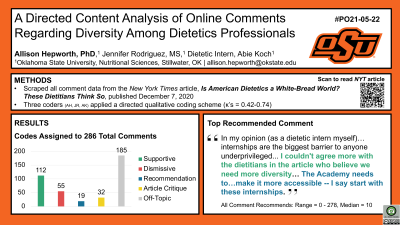Back

Objectives: Data from the 2020 Needs Satisfaction Survey revealed that 82% of registered dietitian nutritionists identified as white and 93% as female. On Dec 7, 2020 the New York Times published the article, “Is American Dietetics a White-Bread World? These Dietitians Think So.” The article presented information about diversity among dietetics professionals and the perspectives of numerous dietetics professionals and organizations. The objective of this study was to describe public comments on this article in order to assess public perspectives on diversity among dietetics professionals.
Methods: The online article was open for comments Dec 7, 2020 to Dec 9, 2020. All published comments and the number of recommends (i.e., endorsements) on each comment were recorded. Three coders (AH, JR, AK) coded all comments using a directed qualitative coding scheme developed by AH: Supportive of diversity; Dismissive of diversity; Recommendation for increasing diversity; Critique of article; or Off-topic. Codes were not mutually exclusive. Inter-rater reliability (Fleiss’ kappa, κ) ranged from moderate to good (κ’s = 0.42-0.74). Descriptive statistics were calculated.
Results: A total of 286 comments (163 original posts, 123 replies) were recorded. More comments were rated as supportive (39%, n = 112) than dismissive (19%, n = 55). Few comments (7%, n = 19) included a recommendation for increasing diversity. A sizeable minority of comments (11%, n = 32) were critical of the article (e.g., tone, information presented). Over half of comments included off-topic remarks (65%, n = 185). Recommends ranged from 0 to 278 (median = 10), with the top 5% of comments receiving ≥ 66 recommends. Among the top 5% of recommended comments (n = 14), 86% were supportive, 29% were dismissive, 29% were critical, 14% included a recommendation, and 29% included an off-topic remark. The most recommended comment (278 recommends) was supportive and included a recommendation for increasing diversity, specifically addressing the unpaid internship requirement.
Conclusions: Results generally indicated public support for diversity among dietetics professionals. However, the high frequency of off-topic remarks and presence of dismissive and critical comments highlight a need for expanded public education about the dietetics profession and importance of diversity, equity, and inclusion.
Funding Sources: None
Nutrition Translation and Communications
(PO21-05-22) A Directed Content Analysis of Online Comments Regarding Diversity Among Dietetics Professionals


Allison Hepworth, PhD
– Assistant Professor, Oklahoma State University, Stillwater, Oklahoma, United States- JR
Jennifer Rodriguez
– Oklahoma State University - AK
Abie Koch
– Oklahoma State University
Presenting Author(s)
Co-Author(s)
Disclosure(s):
Allison Hepworth, PhD: No relevant financial relationship(s) with ineligible companies to disclose.
Objectives: Data from the 2020 Needs Satisfaction Survey revealed that 82% of registered dietitian nutritionists identified as white and 93% as female. On Dec 7, 2020 the New York Times published the article, “Is American Dietetics a White-Bread World? These Dietitians Think So.” The article presented information about diversity among dietetics professionals and the perspectives of numerous dietetics professionals and organizations. The objective of this study was to describe public comments on this article in order to assess public perspectives on diversity among dietetics professionals.
Methods: The online article was open for comments Dec 7, 2020 to Dec 9, 2020. All published comments and the number of recommends (i.e., endorsements) on each comment were recorded. Three coders (AH, JR, AK) coded all comments using a directed qualitative coding scheme developed by AH: Supportive of diversity; Dismissive of diversity; Recommendation for increasing diversity; Critique of article; or Off-topic. Codes were not mutually exclusive. Inter-rater reliability (Fleiss’ kappa, κ) ranged from moderate to good (κ’s = 0.42-0.74). Descriptive statistics were calculated.
Results: A total of 286 comments (163 original posts, 123 replies) were recorded. More comments were rated as supportive (39%, n = 112) than dismissive (19%, n = 55). Few comments (7%, n = 19) included a recommendation for increasing diversity. A sizeable minority of comments (11%, n = 32) were critical of the article (e.g., tone, information presented). Over half of comments included off-topic remarks (65%, n = 185). Recommends ranged from 0 to 278 (median = 10), with the top 5% of comments receiving ≥ 66 recommends. Among the top 5% of recommended comments (n = 14), 86% were supportive, 29% were dismissive, 29% were critical, 14% included a recommendation, and 29% included an off-topic remark. The most recommended comment (278 recommends) was supportive and included a recommendation for increasing diversity, specifically addressing the unpaid internship requirement.
Conclusions: Results generally indicated public support for diversity among dietetics professionals. However, the high frequency of off-topic remarks and presence of dismissive and critical comments highlight a need for expanded public education about the dietetics profession and importance of diversity, equity, and inclusion.
Funding Sources: None

.png)
